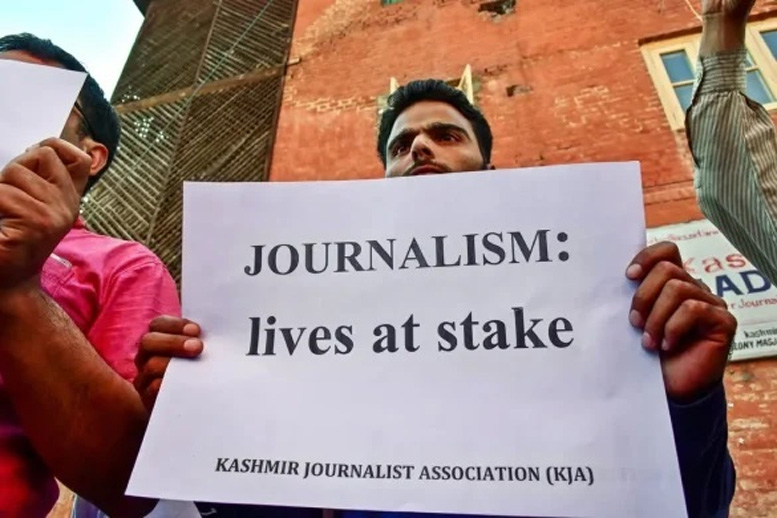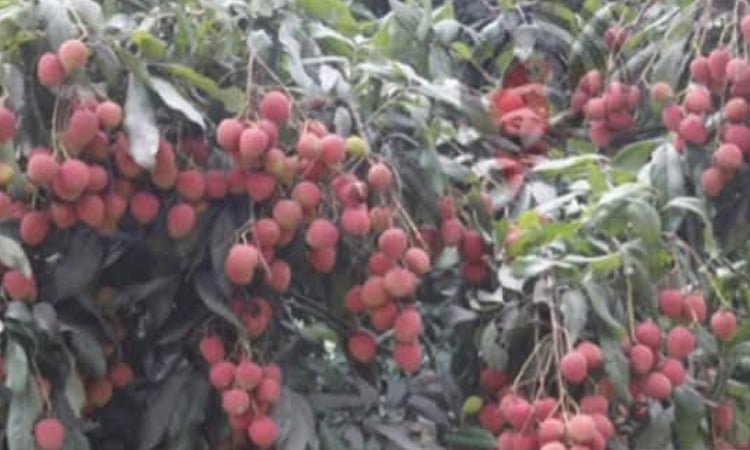
Online Desk: Indian illegally occupied Jammu and Kashmir is one of the most dangerous places and highly militarized zone of the world where people associated with the press and media are performing their professional duties in the most difficult circumstances.
According to a report compiled by Kashmir Media Service Editor, Raies Ahmed Mir, on the occasion of the World Press Freedom Day, today, twenty journalists have been confirmed killed while performing their duties during the Kashmiris’ ongoing liberation struggle since 1989. They include Shabbir Ahmed Dar, Mushtaq Ali, Muhammad Shaban Wakeel, a woman scribe Aasiya Jeelani, Ghulam Muhammad Lone, Ghulam Rasool Azad, Pervez Muhammad Sultan, Shujaat Bukhari, Ali Muhammad Mahajan, Syed Ghulam Nabi, Altaf Ahmed Fakhtoo, Saidan Shafi, Tariq Ahmed, Abdul Majid Butt, Javed Ahmed Mir, PN Handoo, Muhammad Shafi, Pradeeep Bhatia, Ashok Sodhi and Rayees Ahmad Butt.
Since the revocation of Article 370 in 2019, press freedom in IIOJK has sharply declined, with local journalists facing harassment, surveillance, and charges under black laws, while foreign correspondents are denied access or deported for critical reporting. These measures, aimed at controlling the region’s narrative and projecting normalcy, have drawn widespread criticism from international watchdogs, who warn of increasing suppression of both domestic and foreign media.
The report pointed out that the journalists face manhandling, abductions, murder attempts, harassment, detentions, summoning to police stations and death and detention threats by Indian forces and agencies almost routinely in the disputed territory, and all this has made their everyday work extremely difficult. The Kashmiri journalists and many other scribes while performing their professional duties are roughed up, injured and detained by the police forces on fake charges in the territory.
Indian police and sleuths of National Investigation Agency (NIA) arrested journalists under black law, Public Safety Act (PSA) including, Kamran Yousuf on 04 March 2017, Aqib Javeed on 02 July 2019, Qazi Shibli on 08 August 2019, Adil Farooq on 11 Aug 2021, freelance journalist Manan Gulzar Dar on 10 October, 2021, Fahad Shah on 4 February 2022, Sartaj Altaf Bhat on 14 March 2023, freelance journalist and twocircles.net Editor Irfan Mehraj on 21 March 2023, freelance journalist Majid Hyderi on 15 Sept 2023 and Rashid on 25 April 2025, for highlighting the ground situation and gross human rights violations in the territory.
Several journalists including Irfan Meraaj, Sartaj Altaf Butt and Adil are still facing illegal detentions in different jails of India and IIOJK.
On 23 April 2025 Jammu-based senior journalist Rakesh Sharma during a protest in Kathua was brutally assaulted by BJP leaders for raising questions about the absence of Indian forces during the Pahalgam tragic incident. The assault, caught on video, led to widespread outrage among the journalist community who staged protests in Jammu and Kathua.
The Kashmir Press organization in Srinagar said that since Aug 5, 2019 when Jammu and Kashmir was stripped of its political autonomy, the BJP led Indian government “is not enabling journalists and media to operate freely while the press, media and newspapers are working under the orders of Indian army and agencies”.
The journalists are also not allowed by the authorities to write ground situation and news and reports on Indian forces’ cordon and search operation in the occupied territory.
Exiled Kashmiri award-winning photojournalist 31-year-old Masrat Zahra, who, left Kashmir due to Indian police threats and intimidation she faced for her work, which focused on documenting the everyday lives and human rights abuses in the disputed territory. She left in March 2021 through a German NGO that supports persecuted individuals.
Zahra’s departure was a result of the hostile environment for truth-telling in Kashmir, where she faced challenges from state-driven intimidation to gender-based harassment. She was targeted for her Facebook posts, which were deemed “anti-India” by the Indian Police, and she faced an open case under the black law Unlawful Activities (Prevention) Act.Despite the challenges and threats, Zahra persevered in her journalism, documenting the realities of life in Kashmir, including the impact of the ongoing human rights violations on the lives of ordinary people, particularly women and children. Her work has gained recognition both in Kashmir and internationally.
A freelance French journalist, Comiti Paul Edward, was arrested by the Indian police when he was video-graphing the pellet victims in Srinagar city on International Human Rights Day (December 10) in 2017. Comiti Paul Edward later in an interview said that the Kashmiris were facing the worst kind of military repression and human rights violations at the hands of Indian troops and India did not want these happenings in Kashmir to be known internationally. In his documentary released in 2018, Paul Comiti exposed the killing of Kashmiris by Indian forces.
Another French journalist Vanessa Dougnac, who had said that the Indian government had “forced” her to leave India in February 2024, said that she has been issued a one-year permit to resume work in the country. She said in a statement: “The Government of India has authorised me to resume my profession as a foreign correspondent based in New Delhi. A one-year work permit has been granted to me by the relevant authorities.” Dougnac, who has covered South Asia from New Delhi for French publications including La Croix, Le Point, Le Soir and Le Temps, had said that she had been denied permission to work as a journalist in India in September 2022. While she was able to stay on in the country because of her Overseas Citizen of India (OCI) status, the Foreigners Regional Registration Office (FRRO) issued her a notice in January 2024 labelling her of “malicious” reporting. The agency, which operates under the Ministry of Home Affairs, sought an explanation for why her OCI status should not be cancelled for alleged violation of rules. A month later, Dougnac left the country saying she was “being forced to leave by the Government of India”. Dougnac is married to an Indian national and has written on a range of subjects including the tribes (Maoist) news.
Annie Gowan, Bureau chief of The Washington Post for India, was restricted by the authorities in a house in Srinagar on 31st July 2018 and was not permitted to move about in the territory for reporting.
The Pulitzer-winning Kashmiri photojournalist Sanna Irshad Mattoo, was stopped by immigration authorities on 02 July, 2022 at New Delhi airport when she was going to attend a photography event in Paris and again on 17 October 2022 Sanna Irshad Mattoo was stopped by the Indian immigration authorities at New Delhi airport when she was to take a flight to New York to receive the 2022 Pulitzer Prize in a ceremony there.
The freelance journalist Aakash Hassan was barred by the Indian Immigration officials at New Delhi Airport from boarding a flight to Colombo, Sri Lanka, on 26 July, 2022 without giving him any reason, the report said.
Although India has snatched every right including right to freedom of press in IIOJK, Kashmiri journalists are determined to fight India’s assault on media freedom. Local journalist bodies have called upon the international community to come to the rescue of the Kashmiri journalists.
Victimization of journalists in Kashmir has increased manifold since August 05, 2019.
Amnesty International India in a statement said that the arrest of Kashmiri journalist Irfan Meraaj under black law was yet another instance of the long-drawn repression of human rights and the crackdown on media freedoms and civil society in the region of Jammu and Kashmir.
“Indian authorities should prioritize ending impunity for the human rights violations that human rights defenders and journalists have bravely documented and exposed, especially in Jammu and Kashmir, and ensure that human rights defenders and activists can work in a safe and enabling environment without any fear of reprisals,” Aakar Patel, chair of board at Amnesty International India said.
On the occasion of the Press Freedom Day, the 2025 World Press Freedom Index released by Paris-based Reporters Without Borders (RSF) said, the situation is also very worrisome for journalists covering environmental topics or news in Kashmir, where reporters are often harassed by police and paramilitaries, with some being subjected to so-called “provisional” detention for several years.
In 2024 jailed Kashmiri journalist Irfan Meraj, digital and Indian TV journalist Akanksha Saxena, and Srinagar-based journalist Khalid Khan have been announced as the winners of the 2024 Human Rights and Religious Freedom Journalism Awards (HRRFJ). The awards were organised by the Indian American Muslim Council, a Washington, D.C.-based advocacy group, were presented at a ceremony in Chicago, Illinois.
According to a Human Rights Watch statement issued earlier, “While on a professional assignment on 20 March 2023, Meraj was summoned for questioning and detained by Indian National Investigation Agency (NIA) in Srinagar under provisions of the Indian Penal Code and the Unlawful Activities (Prevention) Act.”
Irfan has been booked under the draconian UAPA. The NIA in its press note claimed Irfan was a “close associate” of the Kashmiri human rights defender Khurram Parvez.
In June 2023, United Nations experts expressed serious concerns regarding the charges against and arrest of Meraj and Khurram Parvez, stating that their continued detention is designed to delegitimize their human rights work and obstruct monitoring of the human rights situation in Indian illegally occupied Jammu and Kashmir.
One 09-Jan-2025 Reporters Without Borders (RSF) called on the Indian authorities to lose no time in bringing to justice those responsible for the murder of a 32-year-old freelance journalist Mukesh Chandrakar whose battered body was found in a septic tank in Bijapur, in the east-central state of Chhattisgarh, shortly after he reported on the poor state of a road built by a local contractor, who has been arrested as the main suspect. Two days after 32-year-old freelance journalist Mukesh Chandrakar was reported missing, his body was found on 3 January – with 15 skull fractures, a punctured heart and liver, and a broken neck – in a septic tank near the home of Suresh Chandrakar, a building contractor and close relative, who is now under arrest.
The Chhattisgarh is a dangerous terrain for Indian journalists, the RSF report said.
A week before his disappearance, Chandrakar and Nilesh Tripathi, a journalist with the Indian television station NDTV, produced a report about the poor state of a road for which Chandrakar’s relative was awarded a contract said to be worth several million euros. An official investigation into the contract was opened the day after NDTV broadcast the story on 25 December.
After two days on the run, Suresh Chandrakar was finally located and arrested on 7 January. Three other suspects have also been arrested, including Suresh’s two brothers, Ritesh and Dinesh Chandrakar. “The circumstances of Mukesh Chandrakar’s horrific murder leave little room for doubt. He was killed in retaliation for his work and to silence him. This heinous crime must not go unpunished. We call on the Indian authorities to bring all those responsible to justice as quickly as possible and to guarantee the safety of journalists. Urgent measures must be put in place to protect them, especially those who dare to investigate sensitive stories such as corruption, often at the risk of their lives, said Célia Mercier Head of RSF’s South Asia desk.
Indian Journalist and Right To Information activist Raghvendra Bajpai was killed in a targeted attack on March 8, 2025 while travelling near Sitapur, with the journalist’s family stating they believe the killing could be related to his reporting on irregularities in rice paddy sales. The International Federation of Journalists (IFJ) and its affiliates, the Indian Journalists Union (IJU), and the National Union of Journalists – India (NUJ-I), in strongly condemning the murder and calling on authorities to conduct an urgent and through investigation into the killing, ensuring that those responsible are held to account.






